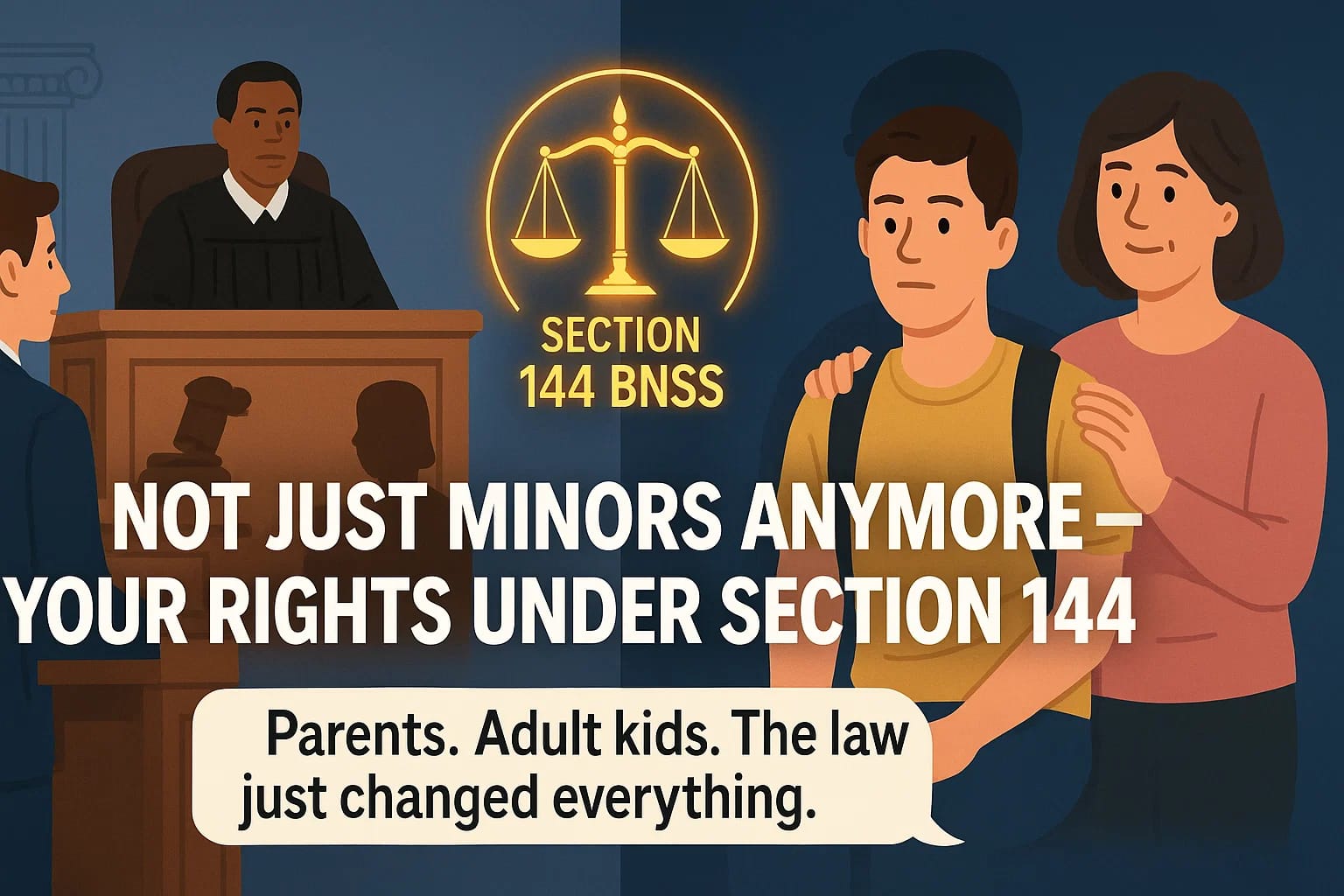Introduction
The Bharatiya Nagarik Suraksha Sanhita (BNSS), 2023, is a significant amendment to India’s maintenance law that essentially substitutes Section 144 of the CrPC for Section 125. One of the biggest changes is the removal of the word “minor” from clauses relating to children’s maintenance. These amendments broaden the scope of legal aid and have the potential to alter the nature of family duties.
Historical Context: From CrPC to BNSS
Under the previous Criminal Procedure Code (CrPC) Section 125, maintenance could only be sought by minor children who were unable to support themselves. Secular and inclusive, Section 125 was adopted in 1973 and covered parents, spouses, and minor children. In Fuzlunbi v. K. Khader Vali (1980), the Supreme Court affirmed it as a social welfare pillar.
However, there was a strict age limit: the entitlement ended when the child turned 18, regardless of their actual level of self-sufficiency.
The Legislative Change: Removing “Minor”
With the BNSS coming into force on 1 July 2024, Section 144(1)(b) removed the word “minor” from references to children’s entitlement for maintenance. Consequently, adult children who are unable to maintain themselves can now claim support from their parent—even if they are over 18—bridging a major gap in previous legal provisions.
This is a deliberate legislative move to expand the welfare scope of maintenance laws, aligning entitlement more with ability than age.
Supreme Court Precedent vs New Scenario
A key ruling in Amarendra Kumar Paul v. Maya Paul (2009) clarified that once a child reached adulthood (majority), they lost Section 125 protection. The BNSS overturns this distinction: adult children unable to support themselves—whether temporarily unemployed, in higher education, or physically/mentally unfit—now remain within the maintenance net.
Still, some interpretive confusion may arise: Section 144(1)(c) explicitly mentions “major” children with “physical or mental inability.” One argument suggests that without such specific mention, clause (b) may not apply to majors unless disabled—though most foresee courts reading clauses (b) and (c) together, given the legislative intent to be expansive.
Who Benefits from the Change?
Adult children (unmarried) who cannot sustain themselves due to unemployment, student status, or underemployment.
Married daughters, where husbands are incapacitated or unwilling to provide support; in such cases, fathers may be directed to maintain them until they attain majority under previous law—now extended to adult daughters if in need.
Sons—the amendment applies irrespective of gender, covering all children, major or minor, based on their dependency status.
Legal Ripples: Retrospectivity & Pending Cases
Will previous applications filed before July 2024 be entitled to the provisions of the amended law? Courts have shown receptiveness to retroactive application of beneficial legislative amendments, as evidenced by the Supreme Court’s application of the BNSS’s undertrial prisoner provisions retrospectively. It is anticipated that pending petitions will gain advantage from the broader scope of Section 144 as it serves the same welfare function. Superior court decisions which determine retroactive effect will ultimately bring certainty.
Policy Implications: A Shift Toward Capability-based Maintenance
Separating eligibility for maintenance from age, BNSS expresses an altered policy approach that replaces capacity-based judgments with age-based thresholds. This aligns the law with contemporary socioeconomic realities where young adults often possess higher education, delayed work lives, or episodic disability.
Also, it is gender inclusive since sons and daughters can access help regardless of their gender or being married. This protection under the law may be greatly beneficial to women, who remain disproportionately vulnerable to losing long-term financial security.
Potential Challenges & Interpretative Issues
There are still some unclear areas:
Ø If courts don’t agree on their interpretation, the word “major” in clause (c) may limit the applicability of (b).
Ø The threshold for “unable to support” remains subjective. Courts will need to clarify criteria: student status? Temporary financial hardship? Cultural and familial expectations?
Ø The enforceability of maintenance against adult children—or elderly parents liable to maintain them—may challenge traditional family dynamics.
Conclusion
The removal of the word “minor” from Section 144 BNSS represents a significant change in Indian maintenance jurisprudence. It removes age barriers and strengthens social welfare protections for adult children by emphasizing need and incapacity. Although interpretive changes are still required, the amendment improves the protection, equity, and dignity of vulnerable family members and puts maintenance law in a better position to handle contemporary familial realities. As it develops under judicial supervision, increased use of BNSS is expected to improve the social resilience and justice of Indian families.

